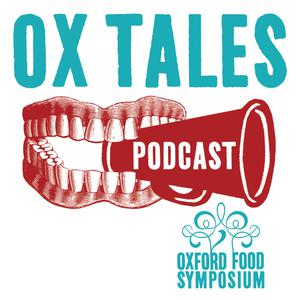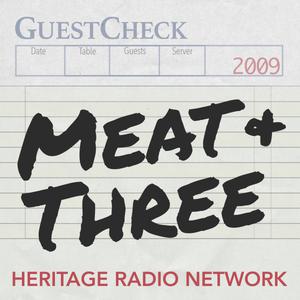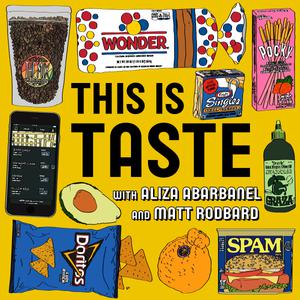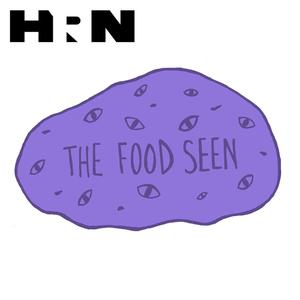
Ox Tales
Oxford Symposium on Food and Cookery
- 23 minutes 5 secondsEpisode 14 - The Grandeur that was Lipa
Filipino food scholar Bel Castro tells the oft-repeated story about a mythic era in the late 19th century in which wealth abounded for Philippine coffee growers thanks to lags in the world market. She debunks and complicates this myth with a political and post-colonial analysis that has relevance for all commodity tales today.
"[The] history of coffee in the Philippines … is told as a fairytale of great golden days, that if you work hard and if we do our job right and we can go back to it when actually it should be a cautionary tale."
--
Ox Tales is produced by Anna Sigrithur, edited by Naomi Duguid and Fiona Sinclair and mixed by Thomas Krause.
Music in this episode was by Ava Glendinning, Uuriter, Nitoy Gonzales and his Rondalla and The American Regimental Band.
Find out more about Ox Tales and the Oxford Food Symposium by visiting our website at https://www.oxfordsymposium.org.uk
--
SUPPORT THE PODCAST!
Donate via our website or listeners in the UK can conveniently make a one time donation of any amount by texting OXTALES and the number you'd like to donate, to 70085. (For example, donate 10 pounds by sending OXTALES10 to 70085).
And don't forget to rate and review us on Apple podcasts or wherever you listen!
29 May 2019, 6:00 am - 26 minutes 2 secondsEpisode 13 - Taking Back the Hospital Tray
What responsibilities do public institutions have in resisting the corporatization of food? Canadian chef and activist Joshna Maharaj shares the trials, the quirks and the successes of a one-year project to overhaul a Toronto hospital’s food system, taking it from frozen pre-packaged foods to fresh, local fare.
"If there's any place on this planet that should have a rolling broth pot, I think it's a hospital."
--
Ox Tales is produced by Anna Sigrithur, edited by Naomi Duguid and Fiona Sinclair and mixed by Thomas Krause.
Music in this episode was by Ava Glendinning, Uuriter, and Bensound.
Find out more about Ox Tales and the Oxford Food Symposium by visiting our website at https://www.oxfordsymposium.org.uk
--
SUPPORT THE PODCAST!
Donate via our website or listeners in the UK can conveniently make a one time donation of any amount by texting OXTALES and the number you'd like to donate, to 70085. (For example, donate 10 pounds by sending OXTALES10 to 70085).
And don't forget to rate and review us on Apple podcasts or wherever you listen!
22 May 2019, 6:00 am - 23 minutes 9 secondsEpisode 12 - Why Kitchen Technology Matters
English food writer Bee Wilson traces the genealogy of kitchen utensils and how they shape our lives-- from vegetable peelers to paleo lithic knives, chopsticks and even the mortar and pestle. She begs the question: why shouldn’t we consider kitchen tools to be just as important as military or industrial technology?
"We think technology means cannons or, I don't know, guns-- and we forget it could be a pot or a pan or even a wooden spoon."
--
Ox Tales is produced by Anna Sigrithur, edited by Naomi Duguid and Fiona Sinclair and mixed by Thomas Krause.
Music in this episode was by Ava Glendinning, Uuriter, Abing, and the Advent Chamber Orchestra.
Find out more about Ox Tales and the Oxford Food Symposium by visiting our website at https://www.oxfordsymposium.org.uk
--
SUPPORT THE PODCAST!
Donate via our website or listeners in the UK can conveniently make a one time donation of any amount by texting OXTALES and the number you'd like to donate, to 70085. (For example, donate 10 pounds by sending OXTALES10 to 70085).
And don't forget to rate and review us on Apple podcasts or wherever you listen!
15 May 2019, 6:00 am - 24 minutes 38 secondsEpisode 11 - Family, Freezing and Fermenting in the Arctic
Arctic culinary scholar Zona Spray Starks explains the diverse range culinary techniques of the Iñupiat people of Alaska, and how the seasonal food landscape shaped family relations. While doing so, she shares the story of her later-in-life return to Alaska and the connections she's built there.
"Frozen is a way of altering food and cooking is a way of altering food, but freezing does the same thing. …And in fact the taste is very different when the meat is almost thawed, it's still a little bit Frozen, but it's almost thawed."
--
Ox Tales is produced by Anna Sigrithur, edited by Naomi Duguid and Fiona Sinclair and mixed by Thomas Krause.
Music in this episode was by Ava Glendinning, Uuriter and Hit of the Week Orchestra.
Find out more about Ox Tales and the Oxford Food Symposium by visiting our website at https://www.oxfordsymposium.org.uk
--
SUPPORT THE PODCAST!
Donate via our website or listeners in the UK can conveniently make a one time donation of any amount by texting OXTALES and the number you'd like to donate, to 70085. (For example, donate 10 pounds by sending OXTALES10 to 70085).
And don't forget to rate and review us on Apple podcasts or wherever you listen!
8 May 2019, 6:00 am - 25 minutes 59 secondsEpisode 10 - Acorns and Civilized Panic
What do famine foods throughout history tell us about the world in which they were eaten? Medieval food and magic scholar Andrea Maraschi makes a mythical and historical foray into the history of the lowliest yet most versatile famine food in Europe, the acorn.
"In times of hardships we need to keep trusting that things are going to get better. We need to keep thinking that yes we are still ourselves we are still who we used to be yesterday and the day before. The easiest way to do so is keeping doing the things that we used to do."
--
Ox Tales is produced by Anna Sigrithur, edited by Naomi Duguid and Fiona Sinclair and mixed by Thomas Krause.
Music in this episode was by Ava Glendinning, Uuriter, Lina Palera, Seikilos Epitaph, Mid Air Machine and Kevin Macleod.
Find out more about Ox Tales and the Oxford Food Symposium by visiting our website at https://www.oxfordsymposium.org.uk
--
SUPPORT THE PODCAST!
Donate via our website or listeners in the UK can conveniently make a one time donation of any amount by texting OXTALES and the number you'd like to donate, to 70085. (For example, donate 10 pounds by sending OXTALES10 to 70085).
And don't forget to rate and review us on Apple podcasts or wherever you listen!
1 May 2019, 6:00 am - 25 minutes 31 secondsEpisode 9 - Seeding a Movement for Health and Culture
Many indigenous communities around Turtle Island (North America) are reclaiming relationships to ancestral seeds after hundreds of years of disconnection due to colonial violence. Chef Sean Sherman and scholar Elizabeth Hoover tell the tales of seeds, seed-keepers, and indigenous chefs who are bringing traditional foods back into focus.
"Thinking about seeds as living relatives-- how do you ensure that they continue to have a relationship with other people in your family, in your community, so that people can continue to plant them and learn from them and eat them?"
--
Ox Tales is produced by Anna Sigrithur, edited by Naomi Duguid and Fiona Sinclair and mixed by Thomas Krause.
Music in this episode was by Thomas Krause, Ava Glendinning, Uuriter, and George Lewis and his New Orleans Stompers.
Find out more about Ox Tales and the Oxford Food Symposium by visiting our website at https://www.oxfordsymposium.org.uk
--
SUPPORT THE PODCAST!
Donate via our website or listeners in the UK can conveniently make a one time donation of any amount by texting OXTALES and the number you'd like to donate, to 70085. (For example, donate 10 pounds by sending OXTALES10 to 70085).
And don't forget to rate and review us on Apple podcasts or wherever you listen!
24 April 2019, 6:00 am - 28 minutes 17 secondsEpisode 8 - The Opium Poppies of Anatolia
What happens when one people’s traditional food is also an international controlled substance? Turkish architect and food researcher Aylin Öney Tan goes on a deep dive into the history of opium poppy cultivation for food in Anatolia and the subsequent decades of international political interference in Turkey’s agricultural production.
“The] opium poppy has always been a source of food for Anatolian people. You have to grow your own food and you have to be self sustained, that’s it!”
Ox Tales is produced by Anna Sigrithur, edited by Naomi Duguid and Fiona Sinclair and mixed by Thomas Krause.
Music in this episode was by Thomas Krause, Ava Glendinning, Uuriter, and Sara Afonso.
Find out more about Ox Tales and the Oxford Food Symposium by visiting our website at https://www.oxfordsymposium.org.uk
--
SUPPORT THE PODCAST!
Donate via our website or listeners in the UK can conveniently make a one time donation of 10 pounds by texting OXTALES10 to 70085.
And don't forget to rate and review us on Apple podcasts or wherever you listen!
17 April 2019, 6:00 am - 28 minutes 25 secondsEpisode 7 - Fermentation as a Co-Evolutionary Force
World-renowned fermentation revivalist Sandor Ellix Katz embarks upon a philosophical and biological journey into the origins of multicellular life, and how the multi-species activity of fermenting foods has played a central role in the evolution of microbes, our bodies-- and even our culture.
“To embrace bacteria particularly as part of our food is a great way to make sure we are increasing biodiversity in our own bodies and maximizing our adaptive potential by embracing the presence of bacteria within us.”
--
Ox Tales is produced by Anna Sigrithur, edited by Naomi Duguid and Fiona Sinclair and mixed by Thomas Krause.
Music in this episode was by Thomas Krause, Ava Glendinning, Sara Afonso, The Jungle, the Cavern, and Sam Bikov.
Find out more about Ox Tales and the Oxford Food Symposium by visiting our website at https://www.oxfordsymposium.org.uk
--
SUPPORT THE PODCAST
Donate via our website or listeners in the UK can donate twenty pounds by texting OXTALES20 to 70085.
And don't forget to rate and review us on Apple podcasts or wherever you listen!
10 April 2019, 6:00 am - 3 minutes 6 secondsComing Soon - Ox Tales Season Two
Announcing Season Two of Ox Tales, premiering April 10th, 2019!
Listen here for a teaser of the Tales to come.
For more information, including the lineup and guest information, visit our website, www.oxfordsymposium.org.uk/podcast.
We'll see you in a few weeks!
27 March 2019, 6:00 am - 24 minutes 59 secondsOx Tales Episode 6 - Bull's Head Breakfast
Retired LA Times food writer and food historian Charles Perry explains how the 19th century Los Angeles practice of earth-pit barbecuing whole bulls became a culinary craze for settlers who saw the eating of the bull’s head as a wild west delicacy, and how the rise of Hollywood changed the practice into what we know today as the backyard barbecue.
“People had this obscure sense that they had been having too much fun in the 20s and they now were being punished and so everything became suave and elegant and the idea of being able to invite people as if on the spur of the moment for a steak was very appealing.”
---
Ox Tales is produced by Anna Sigrithur and edited by Naomi Duguid and Fiona Sinclair with production help by Thomas Krause.
Music by Thomas Krause and Ava Glendinning.
Find out more by visiting our website at https://www.oxfordsymposium.org.uk/podcast/
23 May 2018, 7:00 am - 23 minutes 42 secondsOx Tales Episode 5 - The Liver is the Message
English performance artist and food scholar Amanda Couch reprises the ancient Mesopotamian art of liver divination, and tries to answer questions from mortality to Brexit by reading the lines and lobes on a sheep's liver.
“Chance, when you use it to make a composition or to make a decision to do something, it’s taking away from those enlightenment ideas of hierarchies of what art is and returning them back to where they were in prehistoric times when art objects were connected to ritualistic acts.”
---
Ox Tales is produced by Anna Sigrithur and edited by Naomi Duguid and Fiona Sinclair with production help by Thomas Krause.
Music by Thomas Krause and Ava Glendinning.
Find out more by visiting our website at https://www.oxfordsymposium.org.uk/podcast/
17 May 2018, 7:00 am - More Episodes? Get the App
Your feedback is valuable to us. Should you encounter any bugs, glitches, lack of functionality or other problems, please email us on [email protected] or join Moon.FM Telegram Group where you can talk directly to the dev team who are happy to answer any queries.
 Modernist BreadCrumbs
Modernist BreadCrumbs
 TASTE Daily
TASTE Daily
 Cooking By Ear
Cooking By Ear
 Meat and Three
Meat and Three
 This Is TASTE
This Is TASTE
 THE FOOD SEEN
THE FOOD SEEN